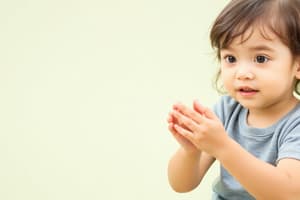Podcast
Questions and Answers
What is motor skill defined as?
What is motor skill defined as?
Behavior that is goal-directed, intentional, and learned.
Interpersonal skills are only relevant in private interactions.
Interpersonal skills are only relevant in private interactions.
False (B)
Which of the following are qualities associated with competence? (Select all that apply)
Which of the following are qualities associated with competence? (Select all that apply)
- Knowledge (correct)
- Motivation (correct)
- Intelligence
- Skill (correct)
What does goal-directed behavior represent?
What does goal-directed behavior represent?
Which theory emphasizes the regulation of behavior?
Which theory emphasizes the regulation of behavior?
What is motor skill?
What is motor skill?
What does interpersonal skill relate to?
What does interpersonal skill relate to?
What is the process that guides a person's responses?
What is the process that guides a person's responses?
Which of the following are qualities associated with competence? (Select all that apply)
Which of the following are qualities associated with competence? (Select all that apply)
What does goal-directed behavior represent?
What does goal-directed behavior represent?
What does the Theory of Reasoned Action propose?
What does the Theory of Reasoned Action propose?
What does the Theory of Planned Behavior extend?
What does the Theory of Planned Behavior extend?
What is emphasized in the Theory of Self-Regulation?
What is emphasized in the Theory of Self-Regulation?
What does the Theory of Trying interpret?
What does the Theory of Trying interpret?
Flashcards are hidden until you start studying
Study Notes
Motor Skills
- Defined as behavior that is goal-directed, intentional, and learned.
- Involves fluent and effective performance.
- Incorporates internal processes for execution.
Interpersonal Skills
- Individuals are socially skilled based on how they interact with others.
- Essential for fulfilling one's own rights and needs.
Process of Interaction
- Responses of individuals are shaped by the reactions of others.
- Highlights the dynamic nature of social interactions and responsiveness.
Qualities Associated with Competence
- Knowledge: Relates to the information an individual possesses.
- Motivation: Concerns the individual's desire to engage in behavior.
- Skill: Refers to the ability to perform actions effectively.
- Goal-directedness: Goals serve as mental representations of desired states, involving intentions and social interactions.
Theories of Goal-Directed Intentions and Behaviors
- Theory of Reasoned Action: Suggests behavior is influenced by intentions, which are shaped by individual attitudes and social norms.
- Theory of Planned Behavior: Extends the previous theory by including perceived behavioral control as a factor.
- Theory of Self-Regulation: Emphasizes the importance of self-control and self-monitoring in behavior.
- Theory of Trying: Focuses on the process of striving towards goal-directed behavior within three domains, making it adaptable to various contexts.
Motor Skills
- Defined as behavior that is goal-directed, intentional, and learned.
- Involves fluent and effective performance.
- Incorporates internal processes for execution.
Interpersonal Skills
- Individuals are socially skilled based on how they interact with others.
- Essential for fulfilling one's own rights and needs.
Process of Interaction
- Responses of individuals are shaped by the reactions of others.
- Highlights the dynamic nature of social interactions and responsiveness.
Qualities Associated with Competence
- Knowledge: Relates to the information an individual possesses.
- Motivation: Concerns the individual's desire to engage in behavior.
- Skill: Refers to the ability to perform actions effectively.
- Goal-directedness: Goals serve as mental representations of desired states, involving intentions and social interactions.
Theories of Goal-Directed Intentions and Behaviors
- Theory of Reasoned Action: Suggests behavior is influenced by intentions, which are shaped by individual attitudes and social norms.
- Theory of Planned Behavior: Extends the previous theory by including perceived behavioral control as a factor.
- Theory of Self-Regulation: Emphasizes the importance of self-control and self-monitoring in behavior.
- Theory of Trying: Focuses on the process of striving towards goal-directed behavior within three domains, making it adaptable to various contexts.
Studying That Suits You
Use AI to generate personalized quizzes and flashcards to suit your learning preferences.



